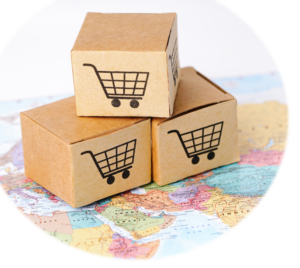Table of Contents:
- Section 321 and Type 86 Entries
- Type 86 Benefits
- Section 321 Fulfillment Options
- Benefits of Section 321 Fulfillment Services
- Should you Outsource Section 321 fulfillment?
- CrimsonLogic Section 321 Fulfillment Solutions
- eCommerce Managed Services
With over two billion digital buyers in the world, the global ecommerce market has plenty of opportunities for businesses whatever the size. In the United States, e-retail sales hit $581.5 billion in the first three quarters of 2020 alone (Census.gov data). Amazon reported a 37 percent year over year increase in Q3 net sales, while Walmart increased its sales by a whopping 79 percent during the same period. The coronavirus pandemic has changed consumer behavior in many ways and it’s been a boon to ecommerce markets not just in the U.S. but the entire world. It has accelerated automation for many businesses and forced many people to shop online for the first time. E-commerce activity is expected to keep growing and those who can adapt to the challenges of the new normal such as Section 321 fulfillment and other eCommerce shipment services will reap the most benefits.
Section 321 Fulfillment: Section 321 and Type 86 Entries
Section 321 is a type of cargo release for goods valued at $800 or less imported by one person per day. Section 321 shipments can enter the U.S. free of tax and duty and without complex paperwork required to be submitted to customs. This helps ecommerce retailers and importers move large volume of parcel shipments into the country cost-effectively while easing the burden on CBP and other agencies.
Most ecommerce parcels in all modes of transport are eligible for Section 321 release except for goods that are part of several lots under one contract, goods subject to anti-dumping/countervailing duties, goods that require inspection, quota goods, alcoholic beverages, tobacco products, and goods regulated by partner government agencies (PGAs) like the Food and Drug Administration (FDA) and the U.S. Department of Agriculture (FDA).
The new Section 321 entry called Type 86 expands the eligibility of low-value shipments to include PGA-regulated goods for the first time. This means sellers and importers can now expedite the release of parcel shipments containing food and cosmetics, among others. However, additional data elements in the form of the Harmonized Tariff System of the U.S. (HSTUS) code and Importer of Record (IOR) number must be submitted to CBP on top of the usual requirements.
Importers and brokers should expect more scrutiny for their Section 321 and type 86 parcels as well as processing delays. In June this year, CBP suggested that filers restrict entries to a maximum of 30,000 per hour due to the high volume of parcels. Filers must also ensure that submitted cargo data is complete and accurate. CBP uses multiple methods to ensure that all data requirements are met and goods do not exceed the $800 limit.
Type 86 Benefits
Type 86 is a voluntary test and importers can continue to use the release on manifest process for parcel shipments. If you are an importer of high-volume ecommerce parcels and have a thorough understanding of HS code classification, Type 86 is a fast and affordable way to clear your shipments. You don’t have to pay the $1 per HBL fee unlike express clearance through an ECCF.
For new importers or those who want to take advantage of type 86 benefits but need help with HS code classification, a third-party logistics provider can help with customs processing as well as trade advisory, compliance optimization, providing alternative logistics arrangements and fulfillment.
Section 321 Fulfillment Options
There are many ways ecommerce retailers get their products to the buyer after a sale. They may use a drop shipper, which is the company that handles physical inventory and fulfills orders on behalf of the store. Sellers, especially startups and small and midsize enterprises (SMEs) who have more time than money, may choose to fulfill their own orders in-house, handling inventory, packaging and distribution. Other retailers have partnerships with logistics companies that handle warehousing and fulfilment.
A third-party fulfillment center takes care of everything once the order has been placed. They often provide additional services such as scaling technology, brokerage, customs processing, warehouse space and trade advisory. Section 321 fulfillment services are usually charged per unit or by the hour, with additional fees for storage, pick and pack, shipping, kitting, returns, and receiving.
Some fulfillment centers operate on an international scale while others are national or regional. Providers with multiple fulfillment centers in different geographic locations allow e-retailers to offer fast and affordable shipping to their customers.
Benefits of Section 321 Fulfillment Services
Scale your business. Fulfillment services typically have flexible pricing to suit your business needs. You don’t have to pay for warehouse space and other services if you’re going through a slow period, and you can quickly ramp up during busy times.
Save time. Let the fulfillment center handle the work so you can focus on more important things, like product development, marketing, improving the customer experience or expanding to new locations.
Access leading technologies and expertise. Section 321 requires automation of customs processes, which can be expensive to build in-house. Fulfillment centers provide the right technologies as well as the talent to help your business succeed.
Optimize compliance. Section 321 and type 86 compliance can get complicated especially with the new HS code requirement. You need an automated solution for accurate e-document preparation and submission, tracking exceptions, record keeping and improving visibility.
Should you outsource Section 321 fulfillment?
Whether or not you should outsource fulfillment depends on your business needs and budget. Most retailers start out by fulfilling their own orders then later switch to outsourced fulfillment. It may be time to work with a third-party provider if you are experiencing a growth spurt or expanding internationally for the first time.
Similarly, if you’re so busy packing and shipping orders that you can’t see ahead and grow the business, it’s time to let others handle fulfillment. It also makes sense to outsource if you have sales that fluctuate throughout the year, as third parties can adapt to your needs and provide a consistent experience to customers.
Outsourcing is a must if you are expanding to new locations. Your current setup and infrastructure will likely limit growth, plus you need an expert to navigate challenges like higher shipping costs and longer delivery times. If you are entering the North America market for the first time, you’ll need a partner who can guide you through the constantly changing regulatory environment.
CrimsonLogic Section 321 Fulfillment Solutions
CrimsonLogic helps businesses of all sizes participate and succeed in the lucrative ecommerce market by leveraging industry-leading technologies and decades of expertise in global trade. CrimsonLogic provides a complete suite of flexible services to make Section 321 fulfillment as hassle-free as possible, whether you are startup or an established player.
Ecommerce Managed Services
CrimsonLogic ecommerce managed services automates Section 321, type 86 and customs reporting to CBP for fast release of high-volume parcels. The service also includes:
Brokerage Assistance. Work with licensed customs brokers who are experts in North America e-commerce and global trade. We can act as your authorized representative and process all Section 321 and Type 86 shipments on your behalf via ABI in ACE.
Logistics Arrangements like CFS (Container Freight Station) clearance. Skip the express clearance fee of $1 per HBL with more airport and pricing options than any other ECCF.
Smart HS Code Classification. AI-powered software makes HS code classification a breeze for your type 86 entries.
Trade Advisory. Get expert assistance 24/7 from our team of experts on customs compliance matters.
Flexible Technology. CrimsonLogic provides flexible technologies that scale with your business.
Learn more by visiting our page on Section 321 fulfillment or contact ustoday!






